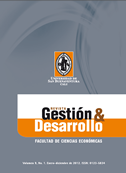La Revista Gestión & Desarrollo proporciona acceso abierto e inmediato a su contenido, basada en el principio de ofrecer al público un acceso libre a las investigaciones para ayuda a un mayor intercambio global de conocimiento.
Excepto que se establezca de otra forma, el contenido de esta revista cuenta con una licencia Creative Commons Attribution-NonCommercial-NoDerivatives 4.0 International (CC BY-NC-ND 4.0) que puede consultar en http://creativecommons.org/licenses/by-nc-nd/4.0/
- Attribution — You must give appropriate credit, provide a link to the license, and indicate if changes were made. You may do so in any reasonable manner, but not in any way that suggests the licensor endorses you or your use.
- NonCommercial — You may not use the material for commercial purposes.
- NoDerivatives — If you remix, transform, or build upon the material, you may not distribute the modified material.
- No additional restrictions — You may not apply legal terms or technological measures that legally restrict others from doing anything the license permits.
Abstract
The researchers network Ascolfa-Riaco, formed by the appointed universities to Capítulo Oriente (East Chapter), and the Faculty of Management, Economics and Accounting Studies from the Universidad de Santander (UDES) have great interest to contribute to this project in social and economic development of the region, providing strategies to improve attitudes, values and skills facing entrepreneurship to the higher education institutions, future entrepreneurs as agents of socio-economic development and high potential for job creation. In the first phase of the project, students entrepreneurial characteristics are identified and based on that will be proposed in a second phase, training strategies. Later, in the third phase the effects of the implemented strategies will be evaluated, in response to the objectives and principles of the Law for the Promotion of Entrepreneurship Culture. By being involved the academic and research community, the results are expected to impact in the region to stimulate production with the creation and sustainability of competitive companies. The application of the data collection tool takes students from different universities of East Chapter.
Keywords:
References
– Centro Interamericano para el Desarrollo del Conocimiento en la Formación Profesional (Cinterfor). Informe V Comisión sobre el empleo de los jóvenes. Disponible en http://www.oitcinterfor.org experiencias. Marzo, 2013.
– Congreso de la República. Ley 1014 de 2006. Ley de fomento a la cultura del emprendimiento.
– FUENTES P. F. (2013). Seis tipos de emprendimiento. Tomado de http://www.emprendovenezuela.net/2011/07/6-tipos-de-emprendimientos.html.
– Global Entrepeneurship Monitor. (2010). Informe ejecutivo. gem, España.
– Instituto Internacional para la Educación Superior en América Latina y el Caribe (Iesalc). (2005). Informe sobre la educación superior en américa latina y el caribe 2000. La metamorfosis de la educación superior. Disponible en: http://www.radu.org.ar//Info/2%20IESALC.pdf
– MORSE, K. y AL-Ali, K. (2012). “El emprendimiento y las aventuras empresariales de alta tecnología”. En: El Colombiano. Entrevista publicada por Community Management.
– Red de Observatorios Regionales del Mercado de Trabajo (Ormet). (2013). Diagnóstico socioeconómico y del mercado de trabajo 2007-2010.
– VESGA, A.; QUIROGA, R. (2012). Universidad de los Andes. Cámara de Comercio de Bogotá. gem, Global Entrepreneurship Monitor. Reporte anual, Bogotá.









